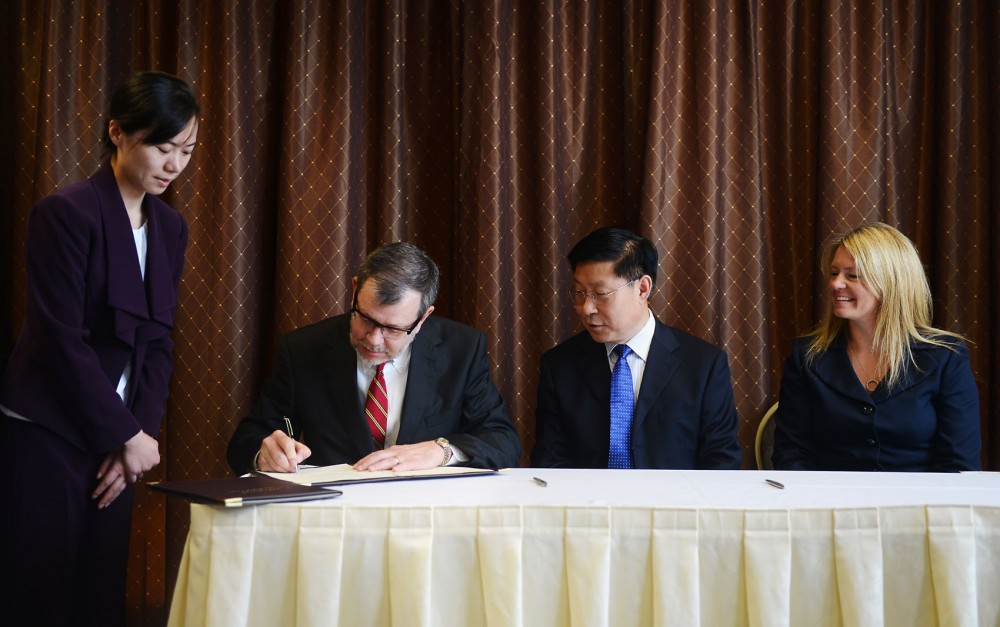The National Center for Food Protection and Defense, a U.S. Department of Homeland Security center housed at the University of Minnesota, gained a new international partner this week.
University President Eric Kaler and Li Xinshi, director-general of the Chinese Academy of Inspection and Quarantine, agreed to a memorandum of understanding on food safety, protection and defense issues during a signing ceremony July 25 in the Campus Club at Coffman Union.
“Particularly in this area of food safety, where we are very strong … this connection with a premier organization around food safety in China is a big deal for us,” Kaler said. “I think it’ll open some doors and provide opportunities across the board.”
The CAIQ is a public research organization in China that focuses on food inspection and protection. The University has been home to the NCFPD, which is part of the College of Veterinary Medicine, since 2004.
Both organizations work to prevent and combat intentional contamination of the food supply for either economic or terroristic reasons, said NCFPD acting director Amy Kircher.
Karen Everstine, a research associate at NCFPD, focuses her work on Economically Motivated Adulteration, or “food fraud.”
She said the partnership will benefit her research and could help to more efficiently identify threats to the food supply.
“If we are talking about bringing in data sources that are going to help us identify something earlier, that is great,” she said. “If there is a question, … you can call and ask, ‘What do you think is going on with this?’”
International opportunities
China isn’t NCFPD’s only international partner.
The center also works with organizations in Central and South America that provide a significant portion of the U.S. food supply, Kircher said.
“Knowing that we have a global food system, it is really important that we work with our collaborators and find partnerships around the world,” she said.
As part of these partnerships, the NCFPD and the University host and collaborate with professionals and researchers from different countries each year, Kircher said.
Everstine said she hopes the new partnership will offer opportunities to study how products move through China’s food system.
“I would love the opportunity to go to China … and see some of their work firsthand,” she said. “And obviously we would offer the same opportunity to them.”
The new memorandum dictates the two organizations will have annual meetings, alternately in China and the U.S.
While the memorandum is not legally binding for either organization, it will be in place for five years unless one party submits a written request to end the agreement early.
“One of the good things about the term limit is it gives both sides a chance to re-evaluate,” Kaler said. “And obviously we hope that it’s been fruitful and people will be eager to continue, but that doesn’t always happen.”
Kaler added that he would be surprised if the University was not in “a really enhanced relationship [with China] five years from now.”
Celebrating 100 years
The new partnership comes at an opportune time.
It has been 100 years since the first Chinese students attended the University, an anniversary the University will celebrate throughout the next academic year, Kaler said.
It also falls on the heels of Kaler’s visit to China, where he renewed partnerships with other Chinese research institutions and organizations.
Li acknowledged the anniversary during his speech, adding that he hoped the ceremony would “open a new age for collaboration for the next 100 years.”
Kaler said signing the memorandum was a significant step for the University’s partnership with China in higher education and scientific endeavors.
“We are extremely proud and very eager to continue to work with [CAIQ] to tackle one of the world’s most critical public health and public safety challenges,” he said.


